Interview with Lucila Dotto, PMI Europe Head of Community, conducted by Aneta Wereszczak
Can you tell us more about your role as the PMI Europe Head of Community and how you help facilitate meaningful connections and learning within the PMI community?
One of the key aspects of my role is to connect, enable and empower our PMI Community by fostering meaningful connections among PMI members and volunteers. Power Skills are cornerstone: effective communications, collaborative leadership, problem solving and strategic thinking. By understanding the perspective and unique challenges of each chapter, volunteer or team member we can tailor the support to their specific needs and help them in the process of bringing innovative ideas to life.
We are committed to creating spaces and opportunities where professionals from diverse backgrounds can come together, share their experiences, and learn from one another. In essence, my role revolves around building bridges and creating an inclusive environment where every volunteer and team member feels valued and supported.
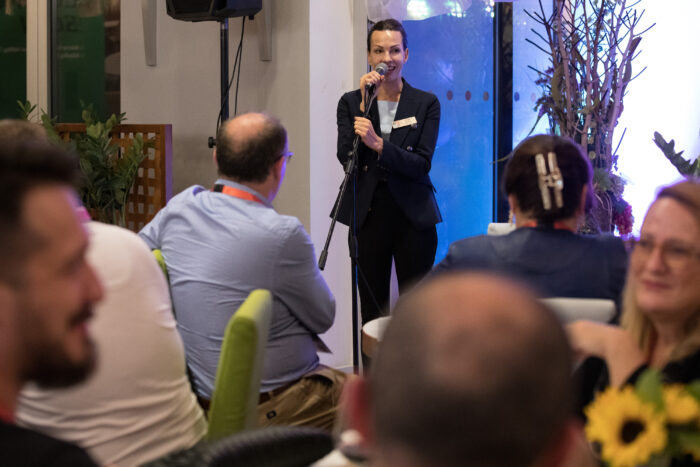 Fot. PMI Europe Leadership Institute Meeting, 2022
Fot. PMI Europe Leadership Institute Meeting, 2022In your role at PMI, how do you envision the future of project management and its impact on society, especially in a rapidly changing global landscape?
I see the future of project management as a dynamic and pivotal force in shaping society. First and foremost, I believe project management will play an instrumental role in driving innovation and progress across various industries. As technology continues to advance at an unprecedented pace, the need for adept project managers to guide complex initiatives will only intensify.
Moreover, project management will become even more intertwined with sustainability and social responsibility. With mounting environmental concerns and an increased focus on corporate social responsibility, project managers will be at the forefront of driving initiatives that not only deliver results but also have a positive impact on the planet and communities at large.
In this rapidly changing global landscape, agility and adaptability will be paramount. Project managers will need to be equipped to navigate unforeseen disruptions, whether they be economic shifts, geopolitical events, or health crises. This will require a heightened emphasis on agile methodologies, risk management, and scenario planning.
Furthermore, collaboration and diversity will be at the heart of successful project management in the future. With teams spread across different time zones and cultural contexts, effective communication and cross-cultural understanding will be vital. Embracing diverse perspectives will lead to more innovative and robust solutions.
Lastly, the role of project managers will extend beyond the boundaries of organizations. They will increasingly become drivers of cross-sectoral collaborations, working with governments, NGOs, and other stakeholders to tackle complex, systemic challenges like healthcare, climate change, and infrastructure development.
Overall, the future of project management is bright and promising. By embracing innovation, sustainability, agility, diversity, and cross-sectoral collaboration, project managers will be at the heart of positive and transformative impact on society in an ever-changing global landscape.
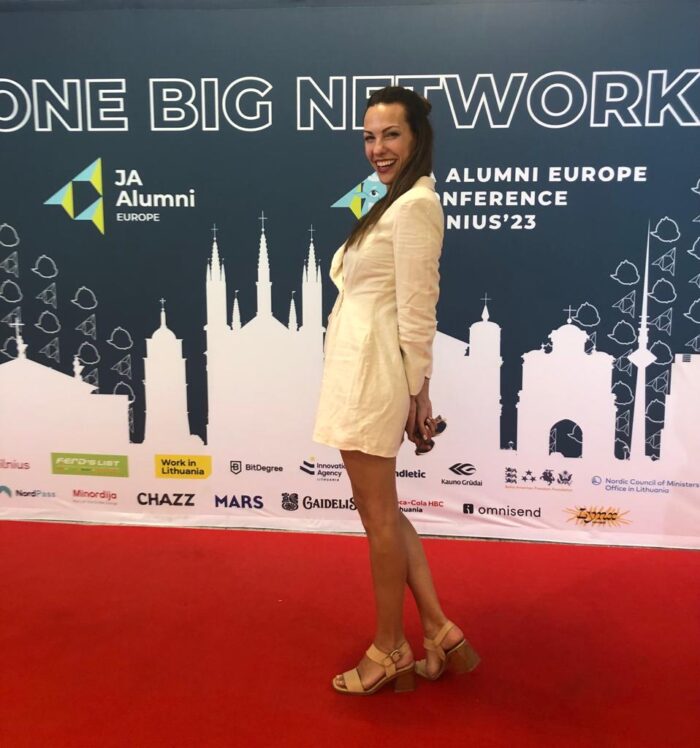 Fot. Europe Conference, Junior Achievement, Alumni Conference
Fot. Europe Conference, Junior Achievement, Alumni ConferenceWith your expertise in culture transformation and leadership development, what are some key insights or strategies you’ve found particularly effective in driving positive change within organizations?
Over the years, I’ve come to realize that successful culture transformation and leadership development are deeply rooted in a few key principles that resonate with me on a personal level. Authenticity breeds trust, and trust is the cornerstone of any successful transformation. Being open, honest, and transparent in communication sets the tone for a culture of openness, where everyone feels valued and heard. I’ve found that empowering individuals at all levels of an organization is pivotal. When team members feel empowered to make decisions and take ownership of their work, they become more engaged and invested in the project and organization’s success.
Furthermore, providing regular, constructive feedback is crucial for individual and collective growth. Pairing this with holding individuals accountable for their actions and decisions fosters a culture of responsibility and ownership. This balance between support and accountability has consistently proven to be a catalyst for positive change.
Finally, celebrating achievements, whether they’re significant milestones or small victories, is a practice I hold close. It’s a powerful way to reinforce a positive culture and keep teams motivated and driven. Recognizing the collective effort and the impact it has on the organization’s journey is instrumental in maintaining momentum.
In essence, these insights and strategies have formed the backbone of my approach to culture transformation and leadership development. They serve as my North Star, providing a constant guiding light in my professional journey. They may be moments when I may feel a bit weary, but they represent the very essence of who I aspire to be.
 Fot. PMI Europe Leadership Institute Meeting, 2022
Fot. PMI Europe Leadership Institute Meeting, 2022You mention your passion for education and your experience at San Andrés university. How do you believe education plays a role in fostering leadership and cultural change within organizations?
For me, learning is the bedrock of personal and professional growth. My eight years at Universidad de San Andrés and now at PMI deeply ingrained in me the belief that education is not just about acquiring knowledge, but a lifelong journey of continuous learning.
When it comes to fostering leadership and cultural change within organizations, learning plays a pivotal role. It equips individuals with the critical thinking skills, knowledge, and insights needed to navigate complex challenges. It fosters a culture of innovation and adaptability, which are essential in today’s rapidly evolving business landscape.
Leadership and cultural change, in essence, are about inspiring others and making a positive impact. Learning provides the tools and perspectives to do just that. It empowers individuals to lead with empathy, to communicate effectively, and to understand the diverse perspectives that make up any organizational culture.
Moreover, a learning mindset promotes a sense of responsibility to drive positive change. It encourages us to challenge the status quo and envision a better future for our organizations and the people within them. It’s about touching others for the greater good, creating a ripple effect of positive influence that can transform entire organizations.
In this way, my passion for knowledge and my experiences at Universidad de San Andrés, KPMG and now PMI have shaped my belief in its transformative power. It’s not just about what we learn formally, but how we apply that knowledge to inspire change and lead with purpose. Education, at its core, is the catalyst for driving leadership and cultural change that can have a lasting, positive impact on organizations and the individuals they serve.
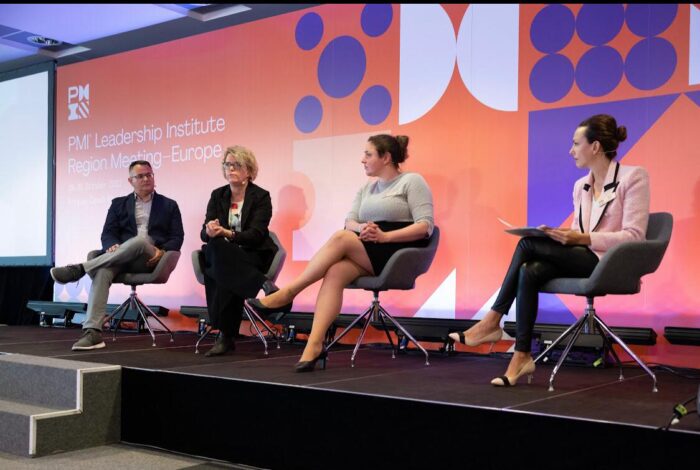 Fot. PMI Europe Leadership Institute Meeting, 2022
Fot. PMI Europe Leadership Institute Meeting, 2022As a subject matter expert in behavioral change, what advice do you have for individuals or organizations looking to drive meaningful and sustainable behavior change?
I’ve come to realize that the power lies in the little things we do consistently. It’s all about cultivating habits that align with our desired outcomes. For individuals seeking personal transformation, start small. Identify one specific behavior you’d like to change, and commit to practicing it daily. It could be something as simple as setting aside a few minutes for mindfulness or opting for a morning walk. These seemingly insignificant actions, when practiced consistently, can lead to remarkable shifts over time.
For organizations aiming to instigate meaningful behavior change among their teams, fostering an environment of support and accountability is crucial. Encourage open dialogue about personal and professional goals, and provide resources to help individuals take actionable steps towards them. It’s also essential to celebrate progress, no matter how small. Recognizing and acknowledging efforts towards positive change can be a powerful motivator.
And don’t underestimate the power of self-reflection. Take time to assess your progress regularly. Ask yourself what’s working and what isn’t. Adjust your approach as needed. And remember, setbacks are a natural part of any change process. Instead of viewing them as failures, see them as opportunities to learn and grow. By consistently applying these principles, both individuals and organizations can create lasting, positive shifts in behavior that contribute to a more fulfilling and successful life.
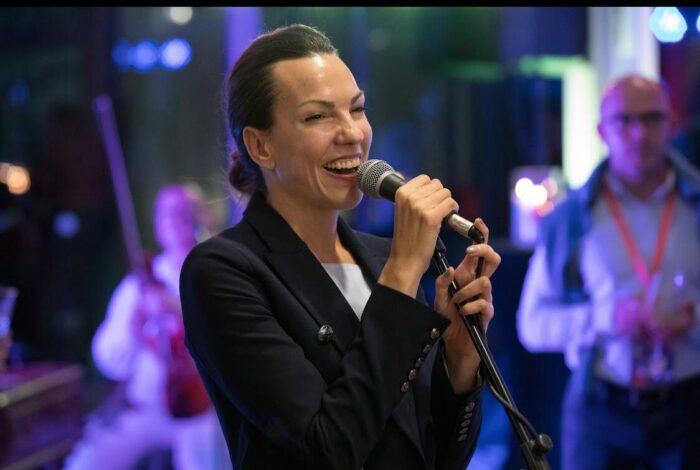 Fot. Fot. PMI Europe Leadership Institute Meeting, 2022
Fot. Fot. PMI Europe Leadership Institute Meeting, 2022With a diverse background spanning consulting, leadership development, and education, what valuable lessons have you learned along the way that you think could benefit aspiring leaders?
I’d be happy to share some of the insights I’ve gathered through my diverse experiences not only in consulting, leadership development, and education, but in life as our journeys are shaped by a mosaic of professional and personal experiences, each contributing in its own way.
I’d say that flexibility, curiosity, and a willingness to learn and unlearn are essential. In a world that’s constantly evolving, staying open and adaptable is key. Embracing change and remaining curious about new ideas, perspectives, other people and ourselves is fundamental.
Another invaluable lesson that’s been passed down to me is the importance of patience in both personal and professional development. At the age of ten, my father shared a poem with me, Desiderata, which emphasized maintaining a genuine interest in our own paths. This poem has served as a constant reminder not to measure my progress against others, as it can lead to unnecessary dissatisfaction.
In the pursuit of career goals, it’s easy to get caught up in comparison, particularly in the age of social media. We can start to feel like we’re not doing enough or not reaching certain milestones fast enough. That’s when I remind myself to be patient with oneself and trust that progress unfolds at its own pace.
Another crucial lesson I hold dear is the significance of finding joy and fulfillment in our pursuits. Enjoying what we do is not only a source of contentment but also a catalyst for excellence. It’s a simple truth: we tend to excel in areas where we find genuine enjoyment and fulfillment. In the end, we only have one life to live. It’s a precious gift, and it’s vital that we make the most of it. Amidst the demands of a dynamic world, it’s crucial to take a step back, reconnect with ourselves, and savor the moments of both personal and professional success.
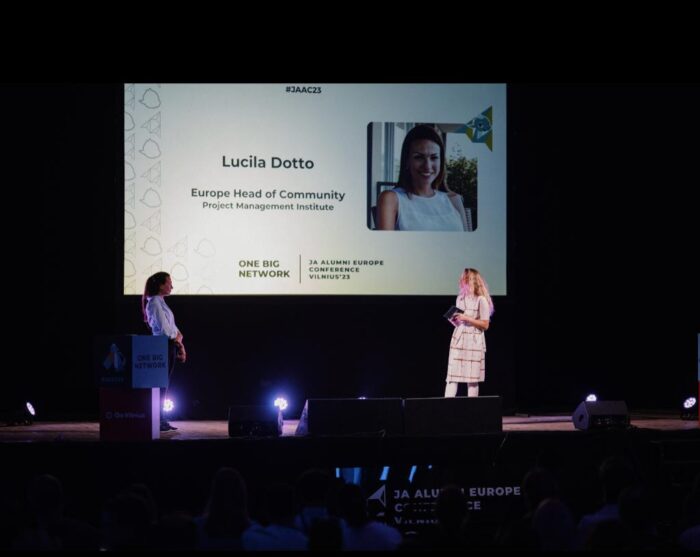 Fot. Fot. Europe Conference, Junior Achievement, Alumni Conference
Fot. Fot. Europe Conference, Junior Achievement, Alumni Conference Given your extensive experience in both the corporate and educational sectors, how do you see the intersection of these two worlds contributing to the development of future leaders and the transformation of organizational culture?
I’ve come to appreciate the profound intersection between these two worlds and the transformative power it holds for future leaders and organizational culture. It’s a dynamic dance, where formal education provides mental stimulation, gifting us with new knowledge and invaluable insights. It lays the foundation, shaping our understanding of leadership principles and strategic thinking.
As crucial as formal education is, it’s in the arena of practical application that these principles truly come to life. Practice is the crucible where theory is tested and refined. It’s in challenging projects that budding leaders truly find their footing. This hands-on experience not only solidifies their understanding but also hones their abilities to adapt, innovate, and make crucial decisions in real-world scenarios.
In this dance of development, continuous learning is the beating heart. It’s the bridge that connects formal education and practical application, ensuring a seamless flow of growth. The corporate world, with its ever-evolving landscape, demands that leaders remain agile and receptive to change. This means staying attuned to the latest trends, technologies, and best practices. Through a commitment to lifelong learning, leaders can navigate the complexities of today’s business environment with confidence and skill.
Ultimately, the fusion of formal education and practical experience creates a synergy that not only shapes the leaders of tomorrow but also has a profound impact on organizational culture. It cultivates a culture of innovation, adaptability, and a thirst for knowledge. This dynamic intersection is where the seeds of transformative leadership and a thriving organizational culture are sown, and it’s a space I find endlessly inspiring.
Europe Head of Community, PMI. Lucila leads the team that works to connect, enable, and empower PMI Community in Europe. She is London base. She is an SME in Culture transformation and Leadership development. Before joining PMI, she worked for KMPG in the People Consulting team and as Global Culture Senior Manager. She also co-founded her own boutique consulting in Argentina. She is passionate about education. She worked for eight years at San Andrés university, where she served in different director roles. An interesting fact? Lucila wrote a book in Spanish, which translates as Have the courage to be yourself.

[ENG] Project Manager with 10 years of experience passionate about sharing the knowledge. Is always learning and cConfesses that she cannot start her day without a cup of coffee. Managing projects during the standard working hours was not enough for her and she joined the local PMI Wroclaw community in 2017. Sha passed the PMP exam the same year. In 2020 she was elected as the PMI Poland Chapter Board Member. Currently she is responsible for PMI Poland Chapter membership. Actively supports the PMI chapter XChange initiative and is fond of getting to know different cultures and perspectives. Enjoys hiking and playing board games. Speaker for international conferences and co-author of the book The Xchange Effect. A Virtual Journey of Cross-Country Collaboration and Co-Creation.
[PL] Kierowniczka projektów z 10 letnim doświadczeniem i pasjonatka dzielenia się wiedzą. Ciągle się uczy i wyznaje, że nie wyobraża sobie rozpoczęcia dnia bez wypicia filiżanki kawy. Zarządzanie projektami w standardowych godzinach pracy jej nie wystarcza, dlatego od 2017 roku aktywnie działa jako wolontariuszka w PMI Poland Chapter. Posiadaczka certyfikatu PMP. Od 2020 roku członkini zarządu PMI Poland Chapter. Obecnie odpowiedzialna za obszar członkostwo w PMI PC. Aktywnie wspiera globalną inicjatywę Chapter Xchange. Uwielbia chodzić po górach i grać w planszówki. Prelegentka na międzynarodowych konferencjach. Współautorka książki The XChange effect. A Virtual Journey of Cross-Country Collaboration and Co-Creation.